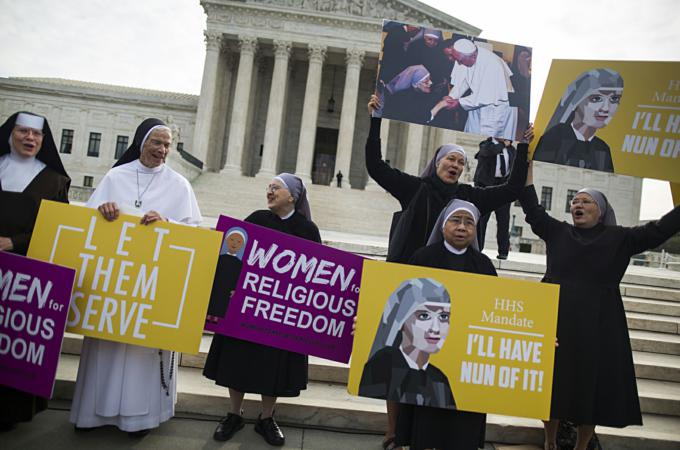The Supremes suggest a real accommodation for the Little Sisters
On Wednesday, March 23, the Supreme Court heard 90 minutes of oral argument in the case of Zubik et al. v. Burwell et al., the case involving a challenge by religious organizations like the Little Sisters of the Poor to the HHS regulation that requires them to either provide free contraceptive coverage to employees or designate their insurer or third-party-administrator of a self-insured plan to provide them.
The following Friday, which happened to be Good Friday, the Court huddled in conference, as is its wont, to discuss the case. Shortly thereafter, the Court took the highly unusual step of asking for supplemental briefing from the parties: "whether contraceptive coverage may be obtained by petitioners' employees through petitioners' insurance companies, but in a way that does not require any involvement of petitioners beyond their own decision to provide health insurance without contraceptive coverage." The religious petitioners answered with an emphatic "Yes. There are many ways in which the employees of a petitioner with an insured plan could receive cost-free contraceptive coverage through the same insurance company that would not require the further involvement by the petitioner....And each one of those ways is a less restrictive alternative that dooms the government's ongoing effort to use the threat of massive penalties to compel petitioners to forsake their sincerely held religious beliefs."
In so doing, the Court suggested that there is a less religiously-restrictive alternative available that would satisfy both the government's interest and the religious reservations of the Little Sisters -- as the federal Religious Freedom Restoration Act (RFRA) requires. If so, then the decision would be favor of the Little Sisters and the other religious organizations and against the federal government.
Going in to oral argument, it seemed likely that the Supreme Court, after the death of Justice Scalia, would likely be tied 4-4 in this case, since the votes of individual Justices would likely replicate their votes a couple years ago in the Hobby Lobby case that was decided in favor of Hobby Lobby 5-4. In that eventuality, unfortunately, the Little Sisters and others would lose, because the lower court decisions would stand in the event of a tie at the Supreme Court, at least until a rehearing could be held with a full Court after a replacement of Justice Scalia were seated.
The federal appeals courts, with one exception which is not before the Court in these consolidated cases, have ruled that the HHS "accommodation" for religious organizations does not substantially burden religious freedom. In asking for briefing on alternatives, though, the Supreme Court is suggesting that it agrees with the Little Sisters on this point, since only if there is such a burden does the law require both that the government have a compelling interest and that it advance that interest in the least restrictive way. Otherwise, the regulation is invalidated as interfering with the religious freedom law.
That makes a lot of sense. Who are we to believe, King Henry VIII or St. Thomas More, as to whether swearing to royal supremacy over the Church violates religiously-informed rights of conscience? Similarly, when the government tells religious organizations and the individuals comprising them not to worry about the religious consequences of just doing whatever government tells them, whose conscience is it, anyway?
There's a very telling footnote in the religious organizations' supplemental brief filed on April 12. It's a bit complicated, as is the regulation and accommodation at issue, but I think it's worthwhile quoting it in its entirety, because it is devastating to the government's case against the Little Sisters and other religious organizations:
"The government's contention that it has a compelling interest in providing (contraceptive) coverage 'seamlessly' -- an argument that emerged late in this litigation -- essentially collapses the separate compelling interest and least restrictive means analysis. To keep those analytical steps distinct, and to protect the coherence of the test Congress fashioned in RFRA, the government cannot insist that it has a compelling interest in utilizing specific means. And, of course, the government cannot simultaneously insist that employers must provide coverage seamlessly and that petitioners are mistaken to perceive that their plans are being used (hijacked) to perceive that their plans are being used to provide the service. If the seams are absent for their employees, then they are absent for the employer. That said, as the Court's order and this brief indicate, it is possible to utilize the same insurer but provide truly separate policies, and such policies are a less restrictive alternative even assuming there is a compelling interest in providing contraceptive coverage through the same insurance company."
Keep praying for the Little Sisters. They could win this case.
- Dwight G. Duncan is professor at UMass School of Law Dartmouth. He holds degrees in both civil and canon law.



















